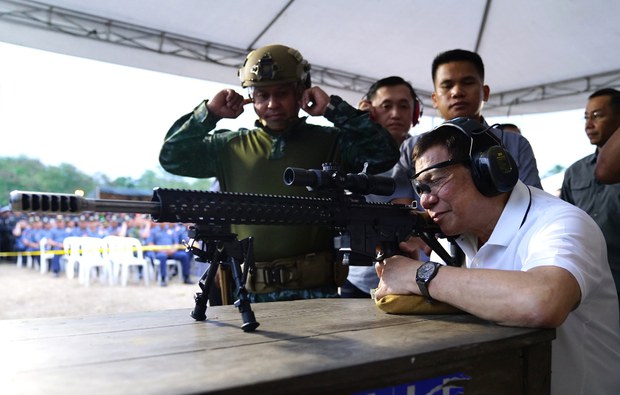After Renewed Pledge, US Gives Philippines New Weapons
2019.03.06
Cotabato City, Philippines
 Filipino President Rodrigo Duterte fires a few rounds from a sniper rifle during the opening ceremony of the National SWAT Challenge in Davao City, southern Philippines, March 1, 2018.
Filipino President Rodrigo Duterte fires a few rounds from a sniper rifle during the opening ceremony of the National SWAT Challenge in Davao City, southern Philippines, March 1, 2018.
The United States has donated new military weapons to help the Philippines fight militants allied with Islamic State extremists, the Filipino army said Wednesday, as a study warned that Manila could face a threat from IS for years to come.
The weapons, 44 brand-new mortars and 80 assault rifles, were part of a grant authorized by President Donald Trump under a U.S. assistance program for the modernization of the Philippine military, Army spokesman Lt. Col. Ramon Zagala said.
“The Philippine Army expresses its gratitude to the U.S. government in granting the assault rifles that will greatly improve the fighting skills of our frontline troops,” Zagala said.
The firearms arrived on Sunday, two days after American Secretary of State Mike Pompeo visited Manila and assured Philippine President Rodrigo Duterte of continued U.S. military support against IS domestically and against Beijing amid territorial wranglings in the South China Sea.
U.S. lawmakers, in raising concerns about the Duterte administration’s war on drugs that has left thousands of suspected addicts and dealers dead, had frozen the delivery of some 23,000 rifles to the Philippine National Police.
Despite bad blood lingering from the controversy over the shipment of rifles, Washington still helped Manila to gather intelligence as Filipino forces battled and defeated IS militants who had seized the southern city of Marawi for five months in 2017.
It is believed, however, that foreign militants may be among those who survived after Filipino forces broke the Marawi siege.
Foreign militants allegedly helped carry out two bombings in the Philippine south – one on Basilan island that left 11 dead in 2018, and an attack that killed 23 people at a church on Jolo island in late January.
Last month, Washington also pledged U.S. $300 million to boost intelligence gathering in the Philippines.
IPAC: Non-military strategy needed
Meanwhile, the Jakarta-based Institute for Policy Analysis of Conflict released a report Tuesday saying that Manila would grapple with the impact of the IS problem over the coming years. Islamic State may have been defeated in Marawi, but the extremist group left behind a vision for a “pure” Islamic state as an alternative to the status quo in the predominantly Catholic Philippines, IPAC reported.
“The challenge to that vision has to be more than military operations aimed at killing known extremist leaders. The Duterte government needs a non-military strategy aimed at addressing the causes of radicalization and preventing the regeneration of militant groups,” said Sidney Jones, the group’s lead researcher.
Should a newly created Muslim autonomous region in the south that is being led by former Muslim separatists can succeed in providing a level of governance, then violent extremism could not thrive in the region, Jones said.
“If, on the other hand, disputes over access to jobs, resources, land and contracts proliferate and disillusionment sets in, pro-ISIS components could get a new lease on life,” she said, using another acronym for IS.
Stronger support for pro-IS components “is only one of several possible outcomes of a failed BARMM but it could be the deadliest,” Jones said, referring to the Bangsamoro Autonomous Region in Muslim Mindanao.
“The single most important goal of counter-terrorism programs and funding in the Philippines now should be trying to ensure that BARMM succeeds in meeting the huge challenges it faces,” she added.
Froilan Gallardo contributed to this report from Cagayan de Oro, Philippines.







